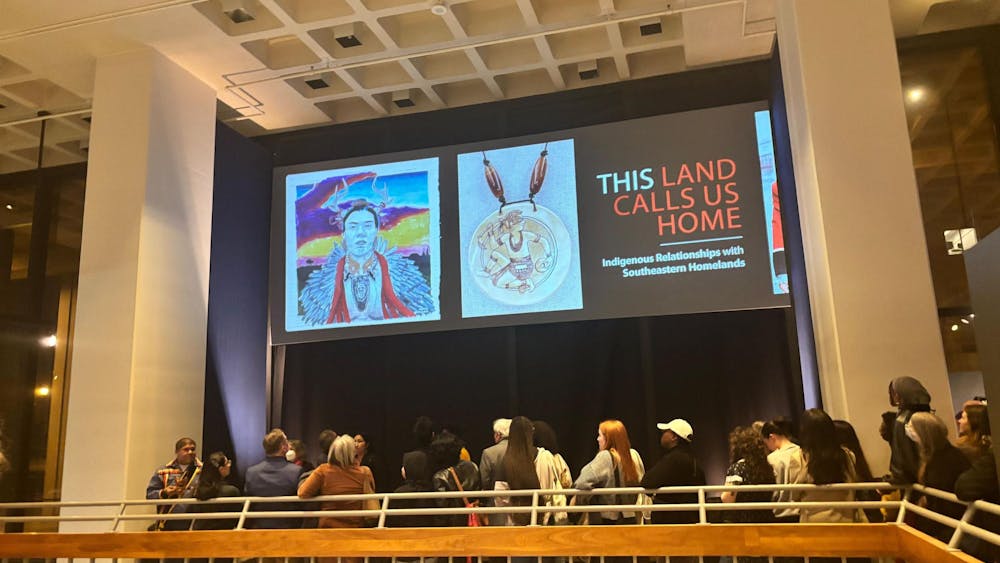
By Elizabeth Howell Managing Editor
The Indian Cultural Exchange (ICE) hosted its annual Diwali celebration on Friday, Nov. 14 at the Omni Hotel downtown.
About 700 students attended the event, which was funded by the Student Government Association (SGA), College Council (CC), Dean of Campus Life Ajay Niar, University President James Wagner and, for the first time, the Resident Hall Association (RHA) and BBA Council.
Students, dressed in bright saris and other formalwear, were shuttled to the hotel from campus. Upon arriving, students gathered in the pre-function area outside the ballroom, where they could mingle with friends, snack on appetizers and take pictures.
The doors to the main ballroom opened at the slightly delayed start time of about 8:15 p.m. due to traffic caused by a Hawks basketball game, but students began crowding around them well in advance. Once the doors were opened, students ran to reserve a table with their friends close to the dance floor.
The presentations and performances of the night began with the singing of both the American and Indian national anthems. Both College juniors and ICE Presidents Adit Gadh and Armaan Nathani and Diwali Chairs College senior Randy Ahluwahlia and College senior Vijay Putatunda gave welcome speeches.
Dooley, accompanied by his guards, made a speech calling for unity and understanding within the Emory community in light of recent acts of intolerance.
Gadh said he thought Diwali plays an important role in bringing the Emory community together.
"The demographic [of Diwali] is people of every culture and ethnicity," he said. "We can be above, and we can come to one event and enjoy and witness a culture without being exclusive."
After dinner, which was catered by the Palace Indian Cuisine, students enjoyed dance performances from Indian dance groups SaRaas, Savera and Satrangi. All male hip-hop group TrickaNomeTry (TNT) and Persian belly-dance team Zeeba teamed up to perform a fusion piece, as did Karma Bhangra and all female hip-hop group Persusian.
The final performance of the night was the senior dance, which included members of the class of 2015. Then, around 11:40 p.m., everyone was invited to get out on the open dance floor, while DJ Jaz provided the music. The first shuttle began taking students back to campus around 11:45 p.m., with the last shuttle and students leaving at 1:30 a.m.
According to Nathani, this year's Diwali included a new philanthropic element. After buying their tickets on campus, students were encouraged to donate $3 to the community service organization Akanksha, which provides education to low-income communities in India, for a chance to win a VIP pass to the event. VIP guests received private transportation to the hotel and preferred seating at the event in addition to having their food brought to them at their table.
ICE also sold saris in the days leading up to Diwali and donated all proceeds to charity. In total, ICE raised over $1000 for philanthropy, Nathani said.
Another change this year was a greater utilization of technology. Ahluwahlia said that ICE "moved anything onto a screen they could" in order to better engage the audience. The pre-function space included TVs with slide shows of pictures from previous Diwalis.
The event also included a video of members of the Emory community, including President Wagner, explaining what Diwali means to them. Additionally, videos introducing the ICE executive board were shown and each of the dance groups had videos play before they performed.
ICE also reorganized ticket sales this year, Nathani said. After selling out in less than three hours last year, Nathani said that they decided to stagger tickets sales across three days, selling 140 tickets each day. ICE chose times based on the course catalogue schedule to make sure no one would have class during ticket sales on all three days.
Students lined up hours before tickets went on sale each day, and ICE consistently had to turn many away.
Additionally, in order to avoid students reselling their tickets at higher costs than they paid for them, ICE created a QR code system to sell tickets.
Each student's ticket was specific to his or her Emory student ID number and email. This ensured that no students could resell tickets without going through ICE.
Through the reselling process, Gadh said that around 50 students were able to get off the waitlist, which included over 200 people and came out on Friday after the last day of ticket sales.
While students got off the waitlist on a first come, first serve basis, Nathani added that ICE prioritized second semester seniors who had never been to Diwali before.
In the future, Nathani said that he could see Diwali only getting bigger. In order to accommodate more guests, the event could eventually take place on campus, he added.
Ultimately, Nathani sees Diwali as a way to teach others about Indian culture.
"It really showcases Indian culture in a way that Emory students want to participate in," he said.
Additionally, Ahluwalia sees Diwali as an opportunity for different types of people to come together.
"Diwali signifies different cultures coming together and celebrating our difference," he said. "We makes us unique is what makes us beautiful people."
– By Elizabeth Howell, Managing Editor





